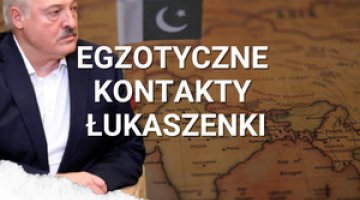The risk of escalating tensions in Minsk-Moscow relations
Belarusian President Alyaksandr Lukashenka boycotted the summit of leaders of countries belonging to the two integration structures controlled by Russia, the Eurasian Economic Union (EaEU) and the Collective Security Treaty Organisation (CSTO), which was held in St. Petersburg on 26 December. This meant that the entry into force of the EaEU's Customs Code was blocked, or at least postponed; for many months Belarus had been expressing serious reservations about the code, while stressing dissatisfaction with the results of its membership in the EaEU.
Since the beginning of 2016 many other points of contention have arisen in Russian-Belarusian relations, such as conditions for oil and gas supplies, the status of the Russian-Belarusian border, the establishment of a Russian military air base in Bobruisk, and the sales of Belarusian food products on the Russian market. However, the direct cause of the Belarusian president's boycott of the summit in St. Petersburg was most likely the statement published on 21 December by General Leonid Reshetnikov, the director of the Russian Institute of Strategic Studies (an advisory body to the President of Russia), and a retired Russian intelligence officer. He unequivocally denied the distinct identity and language of the Belarusian people, and suggested that the Belarusian authorities have been conducting overly independent policies, thus risking the repetition of the so-called Ukrainian scenario. This is the first time such a radical opinion about Belarus has been expressed at such a high level in Russia, which probably reflects the views of the wider Russian elite. Recent developments in ties between Belarus and Russia have confirmed that, in the context of the Russian-Ukrainian conflict and the crisis in relations with the West, the Kremlin expects much greater loyalty from Belarus, and will respond more assertively to any far-reaching expressions of independence by Lukashenka.
An ever-growing list of disputes
Over the past year many problems have accumulated in Russian-Belarusian relations, generating growing tension between the two countries. The main problem is the conflict on Russian energy supplies. Since January 2016 Belarus has been paying for Russian gas supplies on the basis of a unilaterally reduced price of around US$80/bcm, instead of the US$132 provided for in the current contract with Gazprom. Minsk justifies this significant 'discount' by its rights arising from its membership of the Eurasian Economic Union. The Russian side does not accept this argument, and so since the beginning of this year the debt, which according to Russia is currently US$425 million, has been rising. At the same time, in order to force Belarus to settle the arrears, Russia has reduced its oil supplies to Belarusian refineries by a total of 6 million tonnes since June 2016 (of the 24 million planned for the whole year), with the result that the long-term recession of the Belarusian economy has been consolidated (according to the November forecast by the Belarusian Ministry of the Economy, the drop in the GDP in 2016 may reach around 2.6%). Despite previous announcements by both parties, a compromise solution to the problem developed in October has not been implemented, and as a result the Russian oil pipeline operator Transneft has already announced a reduction of 1.5 million tonnes in oil supplies in the first quarter of 2017; the Belarusian authorities, for their part, have announced an increase of 20.5% from January 2017 in charges for the transit of Russian oil to the EU. This dispute is part of a broader discussion on the principles of the EaEU, wherein Minsk has identified numerous non-tariff barriers and the associated lack of a common market, including in the sphere of energy resources.
Another contentious issue is Lukashenka's blocking of the establishment of a Russian Air Force base at Bobruisk, and although this issue has not been mentioned in public statements by politicians from either country since spring 2016, it is very likely still one of Moscow's priorities with regard to Minsk. Another problem is that since the beginning of 2016, the status of the Russian-Belarusian border has come into question. The Russian authorities, who consider that none of their country's border crossings with Belarus has international status, began refusing entry to third-country nationals who were in transit via Belarus to Russia. Minsk is opposed to this approach, citing the common procedures already developed regarding control of the external borders of the Union State of Belarus and Russia. Moscow's solution to this problem would be to introduce a common visa policy, a move which also faces opposition from the Belarusian authorities.
Another point of contention is the restriction by the Russian phytosanitary services on the access of Belarusian food, especially dairy products, to the Russian market, which is crucial for the health of the food industry in Belarus. Russia has justified this decision by claiming, among other allegations, that it has detected the presence of harmful substances in the food, as well as incorrect documentation, and accusing Belarus of dumping its products. The Belarusian authorities have firmly denied the allegations; both sides' rhetoric has been ramped up, and neither party shows any willingness to compromise. A further blow to the Belarusian economy has come from a delay in the payment of US$300 million of the third tranche of the stabilisation loan granted in spring 2016 by the Russian-controlled Eurasian Development and Stabilisation Fund (EDSF). This loan is essential for the stabilisation of Belarus's finances, particularly in the absence of an agreement with the International Monetary Fund, and although representatives of the EDSF have explained the delay in the payment purely in terms of the delay in Minsk's implementation of essential reforms, it is impossible to rule out the influence of the political context of Russian-Belarusian relations.
Belarus's policy of moderate resistance
The growing conflict with Russia is to some extent the result of Lukashenka's habitual policy of obtaining the greatest possible profits from cooperation (both political and economic) with Russia and participating in integration initiatives important to Moscow in exchange for the smallest concessions. One of the Belarusian president's priorities remains his retention of the greatest possible autonomy with respect to Russia. This is why he has openly criticised the unfavourable model of cooperation proposed by Russia within the framework of the EaEU; responded to the reduced supplies of Russian oil by deciding to raise transit fees; and why the Belarusian security services have been taking action against radical Belarusian exponents of the imperial idea of the 'Russian world' (Русский мир), displaying no tolerance for ideaschallenging the existence of an independent Belarus.
Lukashenka's boycott of the summit in St. Petersburg was also a demonstration of his opposition to the denial of Belarusian autonomy. At the same time, during a meeting of the Parliament of the Union State of Belarus and Russia in Moscow on 26 December, the chairman of the lower house of the Belarusian parliament Vladimir Andreichenko, presumably on behalf of the President, strongly protested against "the creation of a false image of Belarusians as enemies of Russia." On the other hand, bearing the events in Ukraine in mind, Lukashenka is trying not to cross the line of what in his mind are 'permissible' actions, so as not to provoke Russia to take even harsher measures against Belarus. To this end, although he has called the benefits of membership of the EaEU into question, Lukashenka has not reduced Belarus's participation in this structure. In addition, although he did not sign the EaEU Customs Code, he authorised the State Customs Committee in a decree to conduct further negotiations. Despite increasingly frequent accusations by Russia, Minsk is not conducting a radical 'nationalist' policy or discriminating against Russian culture, as claimed by the Russian media. The Russian language prevails in the Belarusian media space and education, and the recent personnel appointments in the President's inner circle (including the head of the presidential administration and the minister of education) do not indicate any strengthening of the position of those who favour halting the expansion of the 'Russian world' in Belarus.
Russia's growing expectations
The long list of problems in Russian-Belarusian relations is also a reflection of Moscow's rising assertiveness towards Minsk. The Russian authorities are increasingly expecting specific concessions in exchange for energy subsidies, access to their market or the continuation of credit support. Moscow realises that it is strong enough to put effective pressure on the Belarusian authorities. Moreover, because of its own economic problems, Russia is no longer able to support Belarus at such a high level as in previous years. At the same time, everything seems to indicate that the Kremlin's tough stance is not merely another move in the long history of Russia's difficult cooperation and integration with Belarus. Reshetnikov's statement, radical in both its form and content, shows that calling into question both the sovereignty and autonomy of the Belarusian government and the ethnic and linguistic distinctiveness of the Belarusians is not just the domain of marginal and radical circles, several representatives of which were arrested in Belarus in December 2016. It seems that since the Ukrainian revolution, the Russian elite has changed their perception of Belarus, and now expect absolute loyalty and subordination to an even greater degree. Therefore, Moscow is reacting much more nervously to Lukashenka's habitual attempts to find room for manoeuvre in Belarus's foreign policy, which mainly consists of finding a counterbalance to Moscow in cooperation with the EU and the US. Therefore, although the authorities of the Russian Federation have continued to use balanced rhetoric, during the course of this year tensions between Minsk and Moscow can be expected to escalate further, including open political dispute at the level of the presidents, which could lead to the collapse of the current model of relations between the two countries.
Kamil Kłysiński
in cooperation with Wojciech Górecki





